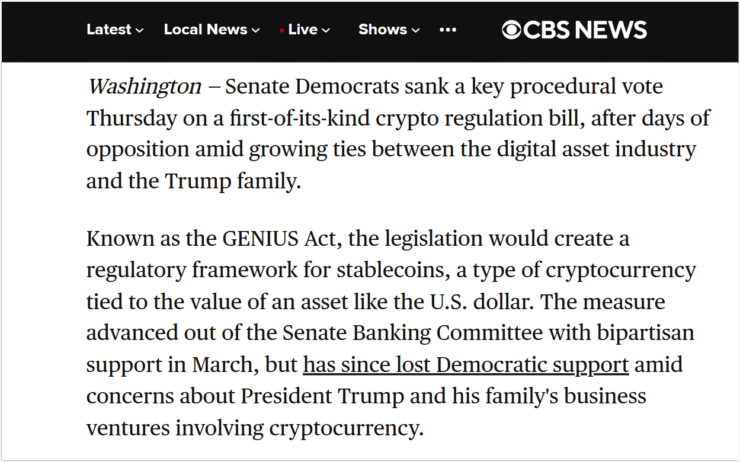Efforts to pass the GENIUS Act—a high-profile bill aimed at regulating stablecoins in the U.S.—suffered a major blow on Thursday after the legislation failed to clear a critical procedural hurdle in the Senate. The setback not only jeopardizes the bill’s future but also dims the broader outlook for crypto regulation on Capitol Hill.
The bill fell short in a cloture vote, which would have ended debate and moved it forward for final consideration. Despite initial bipartisan momentum, several key Democrats who had previously supported the GENIUS Act reversed course, voting against cloture and effectively halting the bill’s progress. Among the dissenting votes were former co-sponsors Mark Warner (D-VA), Ruben Gallego (D-AZ), Lisa Blunt Rochester (D-PA), Kirsten Gillibrand (D-NY), Andy Kim (D-NJ), and Angela Alsobrooks (D-MD).

In a statement following the vote, Warner explained his decision:
“While we’ve made meaningful progress on the GENIUS Act, the work is not yet complete, and I simply cannot in good conscience ask my colleagues to vote for this legislation when the text isn’t yet finished.”
The GENIUS Act was crafted to provide a clear regulatory framework for issuing stablecoins—tokens pegged to fiat currencies and foundational to the crypto economy. Its failure to advance now forces lawmakers to either renegotiate the bill or risk sidelining crypto regulation amid an already packed legislative calendar.
More broadly, the defeat is seen as a warning sign for the crypto industry, which had viewed the bill as a much-needed path to regulatory clarity. Without unified legislative direction, the space may continue to face a patchwork of state-level rules and federal ambiguity—especially as political concerns, such as Trump administration ties to crypto, complicate bipartisan cooperation.
Trust Breakdown Threatens Other Crypto Bills in Congress
The Senate failure of the GENIUS Act is already casting a shadow over other pending crypto bills and raising fears that the broader legislative agenda for digital assets could stall. What once looked like a rare bipartisan opportunity is now being viewed as a cautionary tale about political volatility and procedural missteps.
Until just days ago, the GENIUS Act appeared to be on a fast track, with strong bipartisan support and momentum toward the 60-vote threshold. But that momentum unraveled quickly. According to sources familiar with the matter, a new draft of the bill was circulated without full consultation with Democratic co-sponsors—igniting backlash over a perceived lack of transparency.
Further complicating the picture were a string of announcements from Donald Trump and his family, including new crypto ventures and the launch of a Trump-affiliated stablecoin project. These developments raised red flags among Democrats, who feared the legislation could be co-opted for political gain.
Nine Senate Democrats eventually pulled their support for the bill, citing unresolved anti-money laundering provisions and national security concerns. That collective withdrawal was enough to derail Thursday’s cloture vote—and may have long-term implications for other crypto proposals.
Now, lawmakers worry the fallout will ripple across both chambers. A parallel stablecoin bill in the House, along with wider crypto market structure legislation, may lose traction if the bipartisan trust required to pass them continues to erode.
Crypto Lobbying Momentum Falters After Senate Bill Collapse
After years of sustained lobbying, the crypto industry was beginning to gain real traction in Washington. By early 2025, digital asset regulation had risen to the top tier of Congressional priorities, driven by growing institutional adoption and regulatory urgency.
But the Senate’s failure to advance the GENIUS Act has renewed doubts about how far that momentum can go. What was shaping up to be a landmark year for crypto legislation now faces serious headwinds, as political polarization and industry controversies fuel resistance on Capitol Hill.
The setback has also reenergized critics of the crypto industry’s growing influence in politics. In 2024 alone, crypto firms spent more than $119 million backing pro-crypto candidates, according to OpenSecrets. While that investment briefly appeared to be translating into legislative wins, the defeat of the GENIUS Act has undercut those gains—exposing the fragility of bipartisan alignment.
Without swift recalibration, other crypto bills could stall in similar fashion. As lawmakers weigh public scrutiny, election-year dynamics, and ethics concerns tied to Trump-linked tokens, the path forward for digital asset legislation remains deeply uncertain.
Quick Facts
- The GENIUS Act failed to clear a key Senate cloture vote, receiving only 49 votes.
- Several Democrats, including original co-sponsors, withdrew support over unresolved concerns.
- The crypto industry invested over $119 million in pro-crypto lobbying last year.
- The bill’s collapse may hinder progress on other crypto legislation across Congress.





